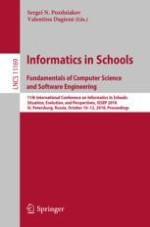2018 | OriginalPaper | Buchkapitel
A Core Informatics Curriculum for Italian Compulsory Education
verfasst von : Luca Forlizzi, Michael Lodi, Violetta Lonati, Claudio Mirolo, Mattia Monga, Alberto Montresor, Anna Morpurgo, Enrico Nardelli
Erschienen in: Informatics in Schools. Fundamentals of Computer Science and Software Engineering
Aktivieren Sie unsere intelligente Suche, um passende Fachinhalte oder Patente zu finden.
Wählen Sie Textabschnitte aus um mit Künstlicher Intelligenz passenden Patente zu finden. powered by
Markieren Sie Textabschnitte, um KI-gestützt weitere passende Inhalte zu finden. powered by
